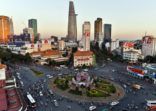As cases decline throughout much of the world, the worst appears to be over with Covid, and Southeast Asia is expected to enjoy an investment revival after a two-year pandemic-induced delay, argues Eastspring.
The recovery has been boosted by global foreign direct investments (FDIs), with total inflows rising by 35% year-on-year to $184bn in 2021, exceeding the pre-pandemic inflow of $181bn in 2019.
Singapore-based Eastspring expects the stream of inflows to continue, especially to the manufacturing sectors.
“The reconfiguration of global value chains (GVCs) following the onset of the pandemic presented a great opportunity for Asean economies to upgrade their participation in GVCs,” said Bryan Yeong, portfolio manager, Eastspring Investments.
“Typically, the decision to relocate GVCs will depend on factors such as labour costs, skilled labour access, infrastructure quality, and information communication technology development.”
Thailand, Malaysia and Vietnam benefits from young populations and workforces, Indonesia is attractive for its natural resources, the Philippines is expected to start relaxing some of its foreign investment restrictions, and Singapore should also benefit given its “flow-through” hub status.
The region’s minimum wage levels are also an attraction to companies setting up manufacturing facilities, according to Yeong.
As geopolitical tensions intensify, the region is seen as more appealing given its exposure to commodities and the diversity of Aasean markets, and Eastspring believes the commodity, tech and auto sectors are best positioned to reap rewards.
Infrastructure
Infrastructure, especially e-commerce and fintech, is another areas which Eastspring expects to benefit from the Covid recovery.
“The pandemic brought to fore the urgent infrastructure gaps in many Asean countries, forcing governments to identify healthcare, telecommunications, transportation, logistics and education as key focus areas in addition to basic services such as water and sanitation,” said Yeong.
“Asean governments have come to recognise the importance of building a digital economy as key to overcoming inequality.”
The disruption caused by these new technologies and the current low penetration rates for e-commerce and fintech represent the future growth areas. Eastspring sees investment opportunities in Indonesia and Singapore, given the new listings in the two countries.
Sustainability
As Asean cities are amongst the world’s most vulnerable to the impact of climate change, sustainable urbanisation should be a top priority for governments, said Yeong. He referred to data from Ernst and Young, which showed that renewable investments in the region are expected to increase to $81.1bn by 2030 from $33.1bn in 2020.
This is set to create significant opportunities in certain sectors, such as energy transition and renewable energies for manufacturing, construction and installation and transport and buildings, according to Yeong.

















